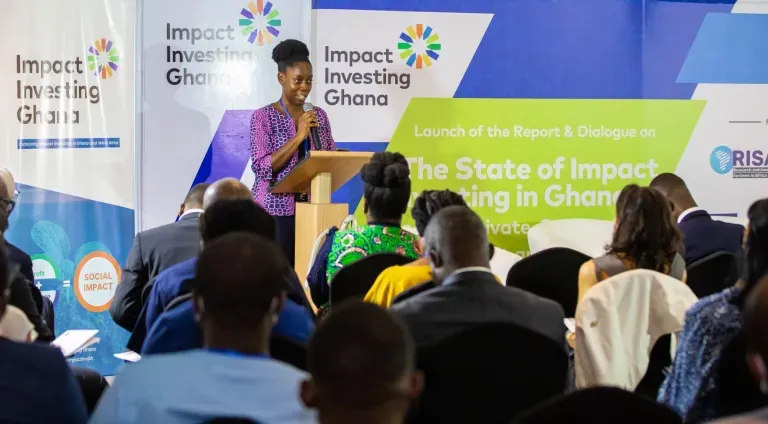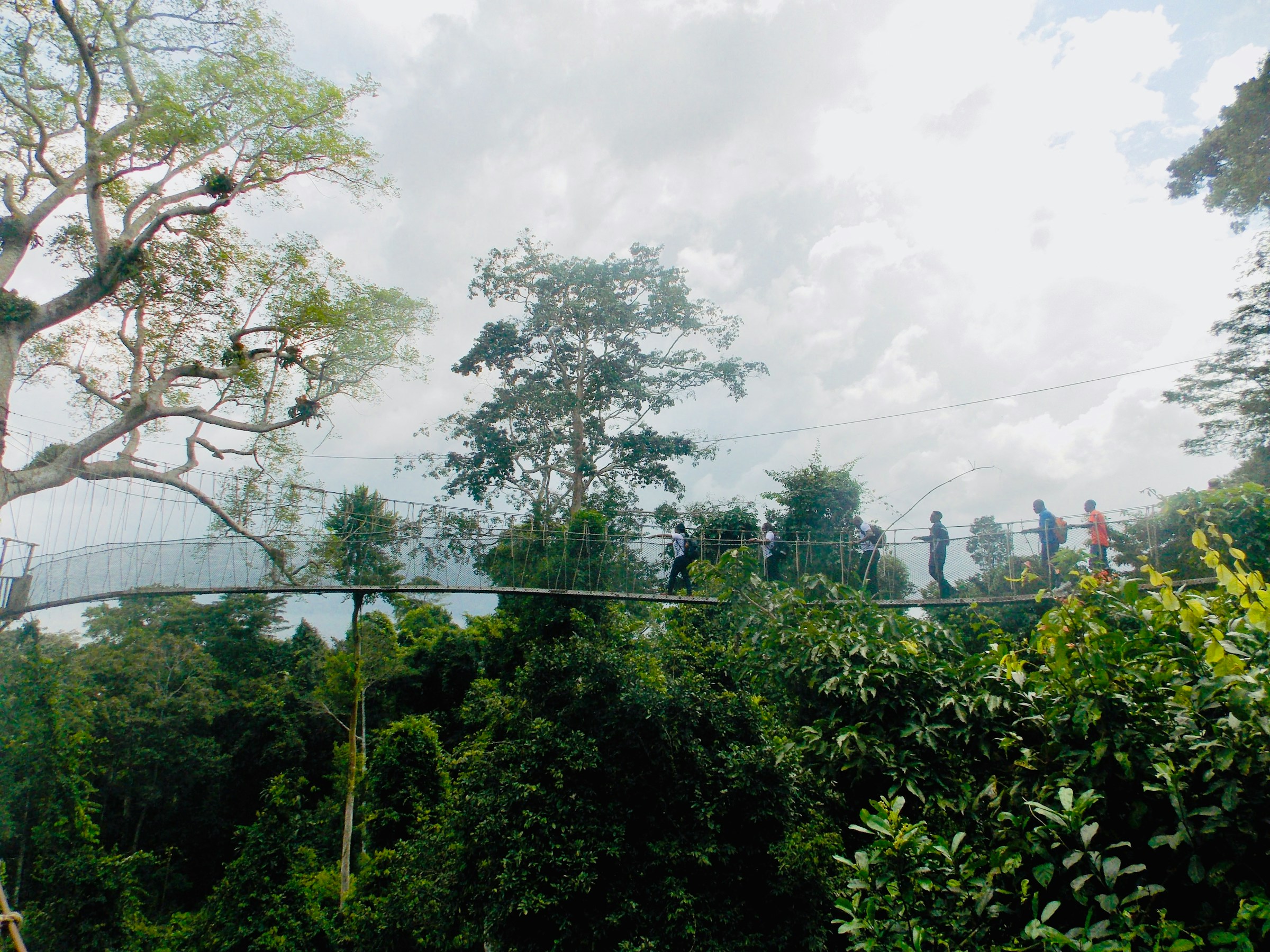
Partnering with Local Think Tanks: The Ghana National Partner Case
This piece is part of a 3-part blog series looking at how GSG National Partners are partnering with local research institutes and think tanks to build the domestic evidence base for impact investing. Learnings are part of a two-year project funded by IDRC and supported by GSG Impact and On Think Tanks (OTT).
Addressing the VC/PE Evidence Gap in Ghana Through Research-Industry Collaboration
In this blog, we explore the approach led by Impact Investing Ghana (IIGh), the GSG National Partner, which assembled a nationwide research collaborative to conduct a baseline study on Venture Capital/Private Equity (VC/PE) in Ghana. The study gathers performance data about the VC/PE industry to encourage greater investment from institutional investors and looks at how impact, gender and social equality have been advanced through VC/PE investment.
KEY HIGHLIGHTS
- Embarking on this research initiative, the Ghana National Partner formed a multi-sector research team, composed of individuals from both the research and VC/PE sectors with expertise in impact investing, which enabled easier access to information and deeper analysis.
- The research provided insights into the Ghanaian VC/PE market’s historical size, sources of capital, deal volume, and value, highlighting growth opportunities, such as attracting more local pension funding.
- The research was also validated by the Ghana Research Industry Collaborative (GRIC), paving the way for the GSG National Partner to translate research findings into actionable outcomes.
- The subsequent engagement of industry stakeholders with the findings will shed light on and enhance understanding of the asset class, and explore opportunities afforded through impact investing, ongoing challenges, and gender inequalities. This data will be especially useful for pension funds that are new to VC/PE as an asset class, and interested in engaging, but lack data and familiarity with VC/PE investing.
In 2021, the Ghana National Partner released a report highlighting significant information gaps hindering investment by domestic institutional investors in venture capital and private equity-based businesses and funds. These gaps included a lack of data on VC/PE fund performance and their potential to drive impact investing and gender equality.
Among its findings, the research underscored the need for greater collaboration between researchers and industry experts to produce and disseminate data that can be used by stakeholders to make informed decisions about sustainable and impact investing, specifically to encourage existing and potential future fund managers, domestic pension funds, philanthropic donors, and other relevant entities, to support Ghana’s small and medium enterprises (SMEs). Ghana’s SME sector accounts for 60% of GDP and employs 80% of people.
Turning Research into Actionable Insights for Private Sector Advancement through Research and Industry Collaboration
Driven to address the gaps highlighted in the study, the GSG National Partner set up the Ghana Research Industry Collaborative (GRIC) in 2021, bringing together researchers, the private sector, government, and international development institutions.
With a total of 25 members — including universities, research institutes, Ghana Venture Capital and Private Equity Association (GVCA), and business entrepreneurs, — the GRIC has conducted virtual meetings looking at research trends, industry and policy standards, and opportunities to foster stronger research-industry collaboration.
For the IDRC project, the Ghana National Partner envisioned a baseline study gathering performance data on the VC/PE industry. Harnessing the model that led it to set up GRIC, it sought to assemble a multi-sector research team with individuals from both the research and the VC/PE industry. This would ensure that the report findings would be actionable from both an evidence and an investor perspective and ultimately contribute to market building.
Building a multi-sector research team bringing together empirical research capabilities and industry experience and perspectives was critical for IIGh. To build a team with the right qualifications, the GSG National Partner identified a set of preliminary criteria:
- Proficiency in the Ghana Ecosystem Gap Analysis Report and expertise in impact investing.
- Significant industry experience, particularly in VC/PE.
- Availability to work within the desired timeframe.
- Willingness to contribute to the knowledge-sharing among researchers, facilitating improved collaboration between NABs and research institutions, as well as fostering collaboration between research and industry.
The team selected to undertake the study includes a research institution, a consulting firm with strong industry consulting experience, and the GVCA, the national association for VC/PE. Through this collaboration between the research industry, IIGh would be able to strike the right balance of data and actionable insight, to make recommendations practical and feasible to implement.
IIGh held a validation workshop with GRIC, the Ghana Venture Capital and Private Equity Association, and key stakeholders from the financial services industry to share research findings and get input into the key recommendations featured in the report. A dissemination and engagement plan will drive the key stakeholders to take action on some of the recommendations. The team’s final report will be released in the second half of 2023.

Figure 1 — Amma Lartey, CEO of Impact Investing Ghana (IIGh), launching the report on ‘The Impact Investing in Ghana: Unlocking Private Sector Capital for Profit and Impact’ at La Villa Boutique Hotel in Osu. Photo Credit: Impact Investing Ghana. Source: B&FT Online
A Year On: More Research Capacity to Address Knowledge Gaps and Foster Multi-Sector Collaboration
Nearly a year later, GRIC is expanding and adding new capabilities. At the GRIC Annual Forum in November 2023, the digital platform will be launched, which will serve as a comprehensive directory of existing and potential research in areas such as social finance, innovation, entrepreneurship, and product development. It recently formulated an action plan to significantly enhance research-industry collaborations in Ghana. The NAB has also hosted further workshops with the GRIC focused on how to drive further research-industry collaboration.
The collaborative efforts of Impact Investing Ghana and local research partners are transforming Ghana’s impact investing ecosystem. By tapping into locally developed and context-specific research and creating a network of researchers focused on researching the field, IIGh’s research and their GRIC collaborative contribute to the growth and success of impact investing in Ghana and the wider West African region.
This blog is part of a series featuring collaboration case studies of NABs from Ghana, Colombia, and Nigeria. Through these inspiring stories, we showcase the power of local NAB-researcher collaborations and knowledge-sharing in unlocking the full potential of impact investing, paving the way for a more sustainable and equitable future.
Stay tuned for more impactful narratives showcasing the transformative power of collaboration!










